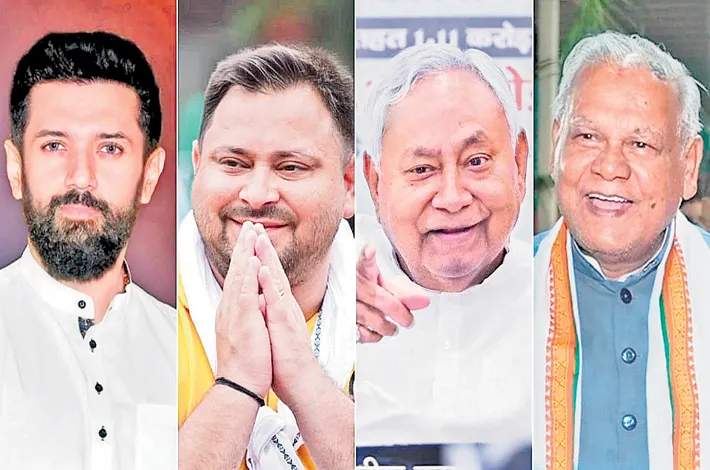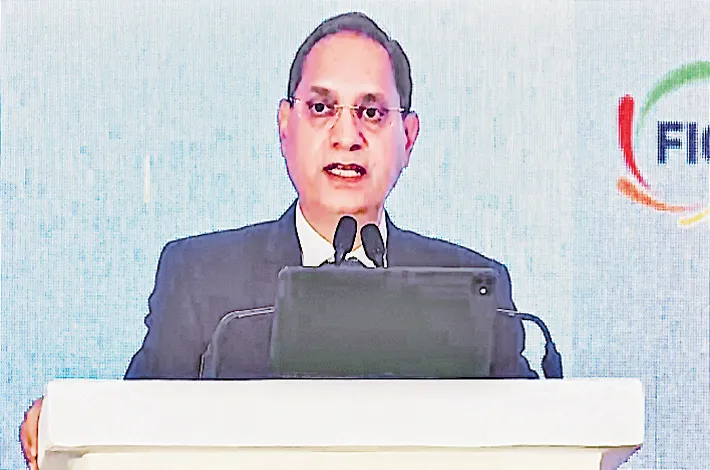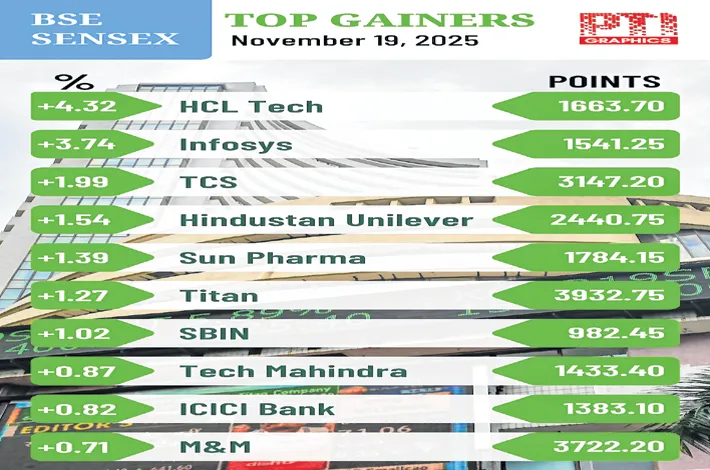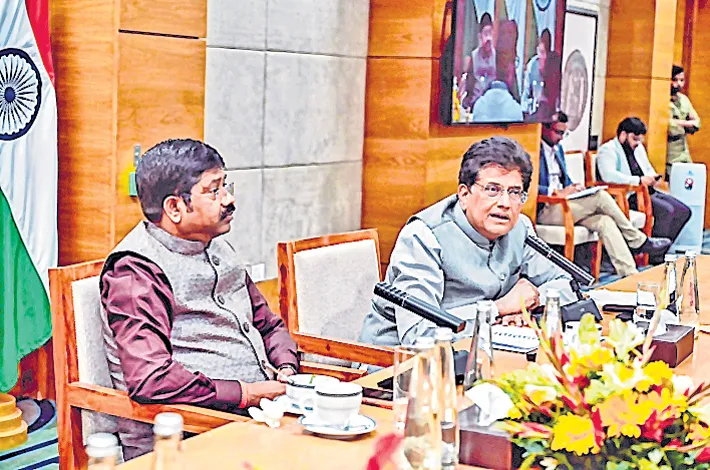Election manipulation allegations rock Bihar
20-11-2025 12:00:00 AM

Appeal and call to action
■ The declaration calls on “We the People” of India to stand united.
■ It demands transparent, accountable, free, and fair elections.
■ The slogan “NO RIGHTFUL VOTER LEFT BEHIND” is emphasized.
■ There is a commitment to continue fighting electoral injustice in upcoming SIR processes in other states.
■ The declaration urges the country to defend the Constitution and democracy through focused, studied collective action.
In the wake of the Bharatiya Janata Party (BJP)-led National Democratic Alliance's (NDA) decisive victory in the 2025 Bihar Legislative Assembly elections, a viral social media video has ignited fresh controversy, accusing the Election Commission of India (ECI) of deploying biased observers to manipulate results in favor of the ruling coalition. The 90-second clip, shared by X user @indian_nagrik on November 18, has garnered over 5,700 views, 250 likes, and sparked heated debates online, with critics calling it a "smoking gun" exposing systemic flaws in India's electoral oversight.
The video, filmed in a serene park, features a sharply dressed female reporter holding a framed portrait of a suited IAS officer—symbolizing what she describes as the "puppet masters" behind the alleged rigging. Speaking directly to the camera against a backdrop of autumn foliage, the reporter dissects data from the recently concluded polls, held from November 6 to 11, claiming that victory margins and sudden vote surges in key constituencies point to deliberate interference.
"If you look closely at Bihar election results and see the data of victory margin and vote addition, you will realise the kind of manipulation that is going on," @indian_nagrik captioned the post, urging viewers to cross-reference it with ECI observer duties. The thread quickly drew responses, with users like @deepakkrssit lamenting "data manipulation at the top of the pyramid" and @anupmankar drawing parallels to the 2024 Maharashtra elections, where similar allegations of foul play surfaced.
At the heart of the claims is the deployment of 243 IAS officers as general observers—one per assembly constituency—to act as the ECI's "eyes and ears," ensuring impartiality. However, the video highlights a stark imbalance: 68% of these officers hail from BJP-ruled states, exceeding their proportional representation (57% of India's states under BJP control) by 11 percentage points. Gujarat alone contributed 14 officers, including several with documented corruption allegations, such as involvement in unauthorized extensions of Adani Ports contracts worth billions, bypassing bidding processes and adding 45 years to existing leases without review.
The reporter zeroes in on "close contests"—20 seats in the 2020 Bihar polls where margins were under 1%—noting that 60% of observers there were from BJP states, alongside 80% of police personnel. Fast-forward to 2025: The NDA secured a comfortable majority with BJP clinching 89 seats and ally Janata Dal (United) 85, totaling over 170 in the 243-member house. The opposition Rashtriya Janata Dal (RJD) managed only 25 seats, with allies like Lok Janshakti Party (Ram Vilas) at 19 and Congress at 6. Critics in the video argue these numbers don't add up when scrutinized against voter turnout spikes and razor-thin margins in NDA strongholds.
"This extra 11% representation isn't a small thing—it's a recipe for theft," the reporter asserts, flashing pie charts showing observer demographics and a map of Bihar's constituencies color-coded by alleged bias. She questions the future incentives for these officers, implying loyalty to the central government could influence their oversight.
The allegations echo broader concerns about electoral integrity in Bihar, a state long plagued by booth capturing and bogus voting. The ECI, in a recent press release, touted the 2025 polls as a "milestone" with innovations like digitized index cards for transparency. Yet, opposition leaders have been vocal.
RJD chief Lalu Prasad Yadav's son, Tejashwi Yadav, who led the Mahagathbandhan campaign, hinted at "pre-planned sabotage" during post-result briefings, though he stopped short of direct accusations. @indian_nagrik , a self-described "meme maker and political researcher" with a focus on "hard takes" on technology and society, replied to a query on solutions by quoting his own 2023 post: "The opposition that can't hit the streets can't come to power." This has fueled calls for street protests, reminiscent of the 2019 anti-CAA agitations.
The BJP dismissed the video as "baseless propaganda" in a terse statement from state spokesperson Vijay Kumar Sinha, who won the Jamui seat by over 20,000 votes. "The mandate is clear—Biharis have rejected dynasty politics," Sinha said, pointing to the NDA's 52% vote share. ECI officials have yet to respond specifically, but sources indicate an internal review of observer deployments is underway.
As Bihar gears up for Nitish Kumar's third consecutive term as chief minister—following a meeting with ally Chirag Paswan on November 18—the video's reach could amplify demands for a judicial probe. With over 147 reposts and counting, @indian_nagrik 's post has transcended X, trending on WhatsApp groups and YouTube shorts. Whether it sparks reform or fades into election-cycle noise remains to be seen, but in a democracy where data is king, these claims remind voters: Numbers don't lie, but who counts them might.
Meanwhile, a group of 175 eminent citizens from various walks of life including retired officials, activists, legal experts, journalists, social workers across the country released a detailed declaration expressing strong opposition to the Bihar State Assembly elections results and raising serious concerns about the electoral process conducted under the Special Intensive Revision (SIR) mechanism by the Election Commission of India (ECI).
It highlights a perceived systematic manipulation of the democratic process, calls for transparent, accountable, free, and fair elections, and demands reforms to restore trust in India’s electoral democracy. They firmly rejects the outcome of the Bihar elections, describing them as fraudulent and manipulated, undermining democratic principles.
The Special Intensive Revision (SIR), they alleged was introduced with a fake narrative as an updated version of the 2003 voters’ list revision process and accused it of being heavily flawed and opaque. Instead of ensuring electoral integrity, it allegedly disenfranchises millions of voters through biased enumeration and rejection procedures, the said.
They also warned that the current electoral processes reflect an authoritarian bent within the government, aiming to retain power through manipulated elections rather than genuine democratic competition. Their main complaint is that votes were allegedly deleted and injected with precision to favor sinister political forces, with no transparency in the revision and rejection processes.
The group of 175, which included famous personalities like former Supreme Court Judge Justice . B. Sudershan Reddy, popular film actor Prakash Raj, columnist and author Parakala Prabhakar further “denounced” the current ECI leadership as failing to safeguard electoral integrity. They accuse the ECI, which was constitutionally mandated to ensure free and fair elections of violating its own principles by endorsing the flawed SIR procedure and failing to maintain electoral integrity.
This, they allege, has led to a crisis of legitimacy for the ECI under its current leadership, highlighting the urgent need for reform or replacement with a body committed to non-partisan and constitutional adherence. They also criticized the political opposition for legitimizing the flawed process by participating in it and for not effectively collaborating with civil organizations which, they claim, were active in defending electoral democracy. They call for a united effort by civil society, opposition parties, and the electorate to restore the sanctity of elections and defend the Constitution.
With 12 more states slated to undergo the SIR process, the declaration warned against complacency and calls for proactive, focused collective action. This forward-looking perspective stresses that the fight for electoral democracy is ongoing and requires sustained vigilance and mobilization across the country to prevent further erosion.








